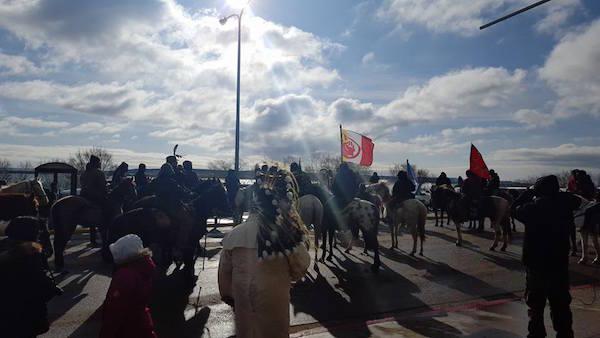Featured image: The spirit riders at Standing Rock show support for keeping the Missouri River waters clean. Image by Steve Sitting Bear.
By Chelsey Luger / Indian Country Today Media Network
In the coming weeks or maybe even days, the U.S. Army Corps of Engineers will issue a decision as to whether or not they will allow the Dakota Access Pipeline, also known as the Bakken Pipeline, to be constructed.
Until then, citizens and allies of the Oceti Sakowin (Seven Council Fires of the Great Sioux Nation) will continue to protest the pipeline, urging stakeholders to recognize the devastation that would ensue should the pipeline be built.
“The DAPL poses a threat to our people, cultural and historically significant areas,” said Paula Antonie, Chair of Shielding the People and a Rosebud Sioux tribal citizen. “We will stand by our Hunkpapa relatives in defending against any major environmental, public health and safety hazards within our treaty territory.”
The proposed pipeline would stretch for thousands miles across four states beginning in western North Dakota and ending in Indiana. It would cross the Missouri River mere feet away from the northern border of the Standing Rock Reservation, threatening to contaminate and destroy the waters.
“When this proposed pipeline breaks, as the vast majority of pipelines do, over half of the drinking water in South Dakota will be affected,” said Joye Braun, a community organizer from the Cheyenne River reservation. “How can rubber-stamping this project be good for the people, agriculture and livestock? It must be stopped.”
While the oil industry would like the public to believe that pipelines are a clean and efficient way of transporting oil with little risk, the data suggest otherwise. According to the Associated Press, there were 300 oil pipeline breaks in North Dakota alone during 2012–2013, and none of them were reported to the public. North Dakota is the second-largest oil-producing state after Texas.
Delegates from the Standing Rock Sioux Tribe have already met with representatives from several federal agencies, including the Army Corps, urging them to reevaluate the environmental impact of the project. The interests of the Standing Rock Sioux were not taken into consideration in the initial environmental assessment. While the Corps decision will have an influence, it won’t be the end of the fight.
“The Corps will get sued either way,” explained Standing Rock Chairman Dave Archambault. “If they approve of the pipeline, the Standing Rock Sioux Tribe will sue them. If they reject it, Energy Transfer Partners will sue them.”
Archambault explained that unlike Keystone XL, which President Obama rejected last November, an executive order will not hold the same weight in this project. While Keystone XL was a federal project crossing the U.S.–Canada border, Dakota Access is a private project and does not cross an international boundary. In addition, most of the landowners along the way have already issued voluntary easements on their property.
Meanwhile, several grassroots groups, tribal citizens, and concerned allies who oppose the pipeline have banded together to work on getting their message out. This conglomerate of activists are calling themselves “Chante tin’sa kinanzi Po” or “People, Stand with a Strong Heart!” Their mission statement says this:
“ ‘They claim this mother of ours, the Earth, for their own use, and fence their neighbors away from her, and deface her with their buildings and their refuse.’ —Chief Sitting Bull. His way of life is our way of life—standing in opposition to the Dakota Access Pipeline is our duty.”
On April 1, Chante tin’sa kinanzi Po set up a horse ride to celebrate the founding of a Spirit Camp that they erected along the route of the proposed pipeline near the community of Cannon Ball in North Dakota.
The camp is called Inyan Wakhanagapi Othi or Sacred Rock, which translates as the original name of the Cannon Ball area.
Dozens of riders and supporters joined in the spirit ride. All are welcome to show support at the campsite, which will be active for an undetermined period of time, or until no longer necessary. They urge all supporters to write letters to the Corps on behalf of tribal interests.
“We do not need oil to live, but we do need water,” said Waniya Locke, a descendant of the Standing Rock nation. “And water is a human right, not a privilege.”


Just discovered you today 4/10/16. This is wonderfulness to the extreme. Thank you so much for Being. I read and post on Indian Country Today, I saw this but didn’t read it. You have no idea how this touches my soul, it’s beyond description.